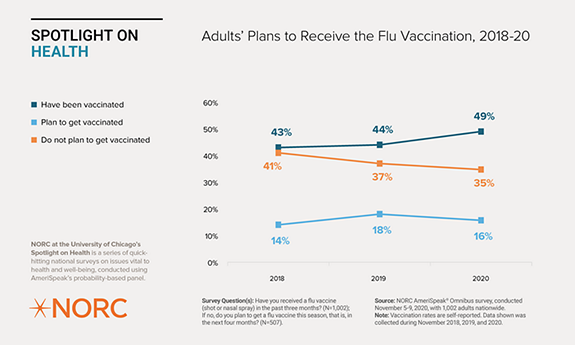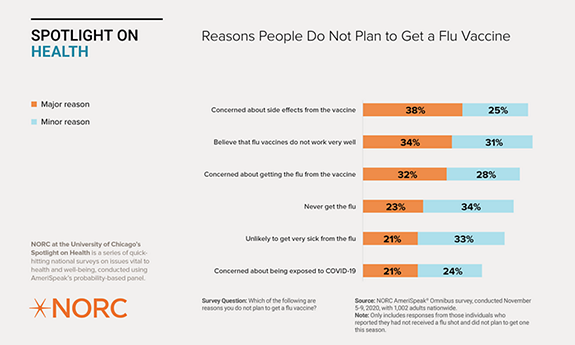More Than a Third of Americans Still Do Not Plan to Get a Flu Shot This Season
As hospitals approach capacity with COVID-19 patients, top reasons for not getting vaccinated include being worried about side effects, and thinking the flu shot is not effective.
Dec. 6 marks the start of National Influenza Vaccination Week.
CHICAGO, Dec. 3, 2020—As America heads deeper into flu season, new survey data show only half (49 percent) of Americans have been vaccinated as of early November. And more than one-third of adults (35 percent) do not intend to get a flu shot this season. These survey findings come from a new NORC Spotlight on Health powered by AmeriSpeak®.
Thirty-five percent of respondents said they were more likely to get a flu vaccine this year because of the COVID-19 pandemic, while 11 percent said they were less likely.
“It is particularly important that people get their flu shot this year to minimize the number of serious flu cases, as COVID-19 patients are straining hospital capacity in many regions,” said Caroline Pearson, senior vice president at NORC at the University of Chicago. “While we have seen a slight increase in early vaccination rates in 2020 compared to past years, half of all residents have yet to be immunized.”


SPOTLIGHT ON HEALTH:
Adults' Plan to Recieve The FLU Vaccination, 2018-19
People over age 60, who are at a higher risk for flu-related complications, report the highest vaccination rate (71 percent). Young adults between the ages of 18 and 29 are the least likely to report being vaccinated, with only 28 percent of this group vaccinated as of early November. Among adults who have children under age 18 living in their home, 43 percent said they do not plan to vaccinate their children.
SPOTLOGHT ON HEALTH:
Adults' Plan to Receive the Flu Vaccination for 2020-21 Season
When asked why they do not intend to be vaccinated, adults were most likely to cite concerns about side effects from the vaccine (38 percent). Thirty-four percent do not think the vaccine works very well. And 1 in 5 people (21 percent) said they do not plan to get vaccinated because they are concerned about being exposed to COVID-19.
“We know the flu shot is highly effective in minimizing the spread of the virus during the winter months,” said Caitlin Oppenheimer, senior vice president of Public Health research at NORC at the University of Chicago. “Unfortunately, a significant number of people will again not get the flu shot this year because of unfounded concerns about its side effects and efficacy.”


SPOTLIGHT ON HEALTH:
Reason People Do Not Plan to Get a Flu Vaccine
Methodology
The self-funded poll was conducted between November 5 and 9, 2020, during a monthly Omnibus survey. It included 1,002 interviews with a nationally representative sample (margin of error +/- 4.05 percent) of adult Americans age 18+ using the AmeriSpeak® Panel. AmeriSpeak is NORC’s probability-based panel designed to be representative of the U.S. household population.
More NORC Research on Vaccines
NORC has conducted the National Immunization Survey (NIS) for the Centers for Disease Control and Prevention (CDC) since 2005, providing annual vaccination coverage estimates for infants age 19-35 months and adolescents age 13-17 years. Vaccines monitored are those recommended by the Advisory Committee on Immunization Practices. Estimates are produced for each state and selected sub-state geographic areas. NORC also conducts the NIS-Flu for the CDC, providing weekly estimates of influenza vaccination rates for children age 6 months to 17 years of age during each flu season since 2010-11. NORC has conducted, published, and presented a variety of research related to methods for deriving the most accurate estimates of vaccination rates possible.
About the AmeriSpeak Spotlight on Health
NORC at the University of Chicago’s AmeriSpeak® Spotlight on Health is a series of quick-hitting national surveys on issues vital to health and well-being, conducted using AmeriSpeak’s probability-based panel.
About NORC at the University of Chicago
NORC at the University of Chicago conducts research and analysis that decision-makers trust. As a nonpartisan research organization and a pioneer in measuring and understanding the world, we have studied almost every aspect of the human experience and every major news event for more than eight decades. Today, we partner with government, corporate, and nonprofit clients around the world to provide the objectivity and expertise necessary to inform the critical decisions facing society.
Contact: For more information, please contact Eric Young at NORC at young-eric@norc.org or (703) 217-6814 (cell).





